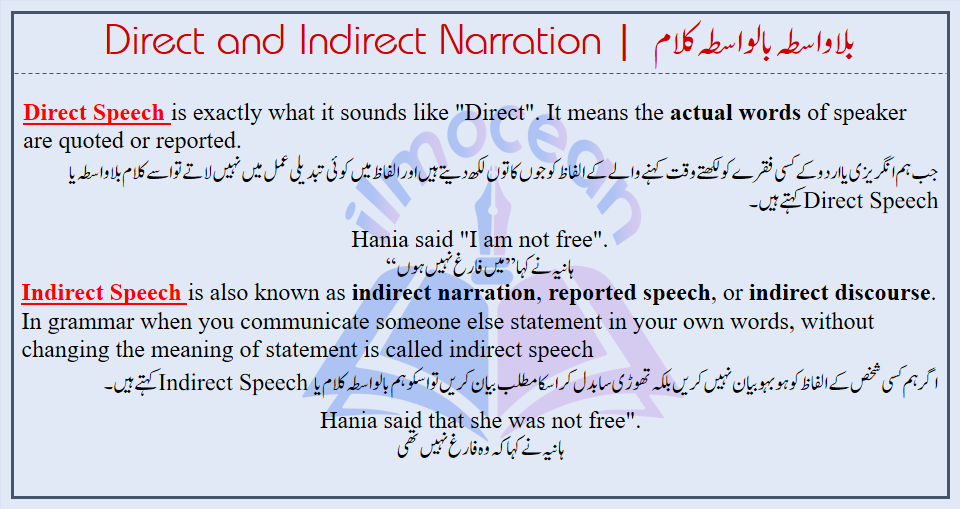Direct and Indirect Speech is the most important part of English Grammar and it is very to learn and memorize with a little effort. Direct and Indirect Speech is one of most vital things of English Grammar. This lesson will help you understand Direct and Indirect Speech in an easiest and simplest way. This lesson is also available in PDF Form at the bottom of Page.
In this lecture we are going to learn:
- What is direct/indirect speech?
- Basic rules of direct and indirect speech.
- Difference between direct/indirect speech.
- Conversion of direct speech to indirect.
- Rules of conversion.
- Examples / Exercise.
- What is direct/indirect speech?
Before direct/indirect, you need to know where from these terms comes. In our daily life we convey the messages of each other. The technique of reporting or delivering the words of a speaker is called Narration.
For example, you are at your class and Mr. Jam, who is your teacher says, “I want to meet your Parent”. When you come home, you will inform your parents in two ways:
Direct: Ahmad said, “I want to meet your parents.”
Indirect: Ahmad said that he wanted to meet my parents.
So, there are two main ways of communicate the words of a speaker.
- Direct Speech
- Indirect Speech
- Direct Speech
Direct speech is exactly what it sounds like “Direct”. It means the actual words of speaker are quoted or reported. It is often enclosed in quotation marks so that the reader understands that the quoted text is the speaker’s original statement. As it uses the exact words of the speaker so Direct Speech is also called a quoted speech.
Example: Hania says “Today, I am not free”.
- Indirect Speech
Indirect speech is also known as indirect narration, reported speech, or indirect discourse. In grammar when you communicate someone else statement in your own words, without changing the meaning of statement is called indirect speech. In this form, the actual words of speaker are converted and said/written in a simple manner.
Example: Hania said “Today, she is not free.”
In first example, writer conveys the girl’s speech directly “I am not free”. In second example writer conveys the girl’s message in his own words but without changing the meaning of words
“Hania said that she is not free.”
- Basic rule of direct / indirect speech
In direct speech is always a comma or colon after said (,) and other part of sentence (spoken words) are written in inverted or quotation marks (” “).
In indirect speech, the comma replaced with (that) and spoken words are not written in inverted commas nor quoted.
Direct: He says, “I want to adopt a cat.”
Indirect: He says that he wants to adopt a cat.
- difference between direct / indirect speech
| DIRECT SPEECH | INDIRECT SPEECH |
| Direct speech reports or quote the exact words of speaker. | In direct speech conveys the message of speaker in simple words without changing the meaning or context of message. |
| its purpose is to quote what was said by someone using quotation marks. | Its purpose is to convey what is said by someone in past. |
| It uses reporting verb, single phrase or quotative frame. | It uses reporting verb such as tell, say, said, talk and speak |
| verb tense remains the same | verb tense changed using indirect speech |
| She says, “I am not going to school” | She says that she is not going to school. |
You may also like to read
Advantages and Disadvantages of Internet
- Conversion of Direct Speech into Indirect Speech
Before conversion rules, you must memorize the different parts of direct speech.
Example: Shazi said, “I am little confuse.”
In the above example:
- Shazi is known as Reporter,
- said is known as Reporting verb and
- “I am little confuse.” is known as Reported Speech.
There are five basic rules to convert any direct sentence into indirect sentence.
Direct: Hania said, “I am very busy now.”
Indirect: Hania told me that she is very busy then.
Rule No 1 : Speaker words are not written in inverted commas. (Hania told me that she is very busy then.)
Rule No 2: Use of conjunction: Remove the inverted comma from direct speech into proper conjunction e.g., that. (Hania told me that she is very busy then)
- Examples:
- Jam said, “I am ill.”
Jam said that he was ill.
- Isha says, “I am pretty.”
Isha says that she is pretty.
Rule No 3: change in pronoun:
| Direct | Indirect | Direct | Indirect |
| I | He/she | It | It |
| You | He/she/they | Us | Them |
| We | They | Our | Their |
| They | They | His | His |
| He | He | Her | Her |
| She | She | Its | Its |
- Examples:
- Rohan will say, “I am tall.”
Rohan will say that he is tall.
- They said, “we are going for movie.”
They said that they are going for movie.
Rule No 4: change in tense:
- Examples:
- Isha said, “I walk.”
Isha said that she walked.
- Ali said, “I am having tea.”
Ali said that he was having tea.
- Maham said, “Honey has left for school.”
Maham said that Honey had left for school.
Tense conversion Chart.
| Direct Speech | Indirect Speech |
| Present simple
(Subject +1ST Form + Object) |
Past simple
(Subject +2ND FORM + Object) |
| Present continuous
(Subject +is/am/are+1ST FORM +ing+ Object) |
Past Continuous
(Subject +was/were+1ST FORM +ing+ Object) |
| Present perfect
(Subject + has/have+3RD FORM+Object) |
Past perfect
(Subject+had+3RD FORM+Object) |
| Past simple
(Subject+2ND FORM+Object) |
Past perfect
(Subject+had+3RD FORM+Object) |
| Past Continuous
(Subject +was/were+1ST FORM +ing+ Object) |
Past perfect continuous
(Subject +had been+1ST FORM +ing+ Object) |
| Future simple
(Subject+ will/shall+1ST FORM+Object) |
Present Conditional
(Subject+ would+1ST FORM+Object) |
| Future Continuous
(Subject +will/shall+be+1ST FORM +ing+ Object) |
Conditional Continuous
(Subject +would+be+1ST FORM +ing+ Object) |
Rule No 5: change in adverb: “now” changed to “then”
| Direct Speech | Indirect Speech |
| Now | Then |
| Here | There |
| Today | That day |
| Tomorrow | The next day |
| Last week | The previous week |
| This | That |
| Tonight | That night |
| Ago | Before |
| Thus | So |
| Hither | Thither |
| Come | Go |
| Hence | Thence |
| Next | Following |
- Exercise Examples:
- He said, “I eat two apples”.
He said the he ate two apples.
- Ramesh said, “I will go to Sri Lanka.”
Ramesh said that he would go to Sri Lanka.
- Ravi said, “What is Heena doing?”
Ravi asked me what Heena was doing.
- Iffa said, “I like your home”.
Iffa told me that she likes my home.
- She said to me, “You should obey your elders.”
She told me that I should obey my elders.
- Convert Below Example by Your Own
- He said, “She is in Delhi.”
- The boy asked, “Where do you stay?”
- Aishwarya Said, “They will be watering plants.”
- She says, “I am in tenth class.”
- I say, “I am an honest man.”
Download PDF Here


